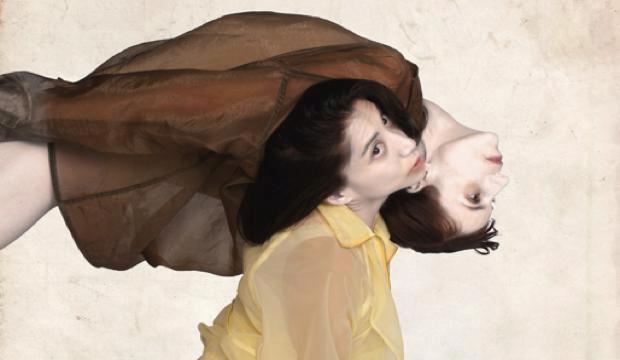
Egon Schiele (1890-1918) was one of the major figures of early 20th-century art. His figurative work, including many nudes and self-portraits, is strikingly raw and compelling, moving away from the decorative elegance of contemporaneous Art Nouveau and pointing towards expressionism, with its jagged lines and distorted perspectives.
Always a neat, cerebral choreographer, Jeyasingh divided Staging Schiele into clear sections: an introduction to Schiele himself as an obsessive observer of his own body; a central section where he interacts with the women in his life; and a final, more literally biographical section ending with his death at the age of 28 in the Spanish flu epidemic of 1918.
Ben Cullen Williams' set is dominated by a cage-like structure, within which vertical neon bars flicker nervously throughout. On comes dancer Dean Hurst as Schiele. He divests himself of his clothes and proceeds to examine his body in a mirror.
He does so obsessively, from all possible angles, squinting and posing, moving closer and moving away, his body contorting in ever more outlandish and revealing positions.
Hurst, formerly of Rambert, is a highly expressive dancer and this section is totally engrossing, his body at once strong and vulnerable, its mysteries dissolving before our very eyes.
He’s then joined by three female dancers – Catarina Carvalho (ex-Company Wayne McGregor), Estela Merlos (ex-Rambert) and Shobana Jeyasingh Dance veteran Sunbee Han, all excellent. Throughout they will take on the roles of the three significant women in Schiele’s life, his cold mother, his artists’ model lover, and his wife.
In extended sequences, they interact with Schiele as models, skimpy clothes on and off, their poses ragged, legs splayed, crotch foremost, creating a progressively darker and disquieting atmosphere, as if Schiele’s own static works had come to life in Adam Carrée's glaring lighting design.
The disquiet is enhanced by Orlando Gough’s specially commissioned score, where a bed of dissonant piano notes is overlaid with operatic voices reciting or singing three poems by Schiele himself and one love poem by Rilke.
This section is fleshed out by diffuse black and white video projections that fleetingly form portraits of Schiele's contemporaries, including his mother (video design by Yeast Culture). It is, however, a little too long and uncharacteristically meandering. There are only so many splayed legs you can see before the point has been made, the climate established, and you long to move on.
The final section recaptures your attention. Here Schiele comes out of three weeks’ incarceration for offending public morals and abandons his mistress, who had supported him throughout, to marry a more suitable middle-class girl. A vicious tug of war between the three aptly evokes the moral struggle involved.
The final scene where Schiele and his new wife succumb to Spanish flu, is suffused with a sense of peace, as if premature death, tragic as it was, had come as a liberation from the frenzy that went before.
Staging Schiele is not perfect, but like all of Shobana Jeyasingh's works it is highly intelligent, choreographically striking and well worth seeing.
NOTE: Shobana Jeyasingh Dance, Staging Schiele will be broadcast online on Friday 15 Nov at 5pm
Details: shobanajeyasingh.co.uk #StagingSchieleLive
| What | Shobana Jeyasingh Dance, Staging Schiele review |
| Where | Queen Elizabeth Hall, South Bank Centre, Belvedere Road, SE1 8XX | MAP |
| Nearest tube | Waterloo (underground) |
| When |
04 Nov 19 – 05 Nov 19, 19:30 Dur.: 55 mins approx |
| Price | £18-£24 (+booking fee, concessions available) |
| Website | Click here to book |
